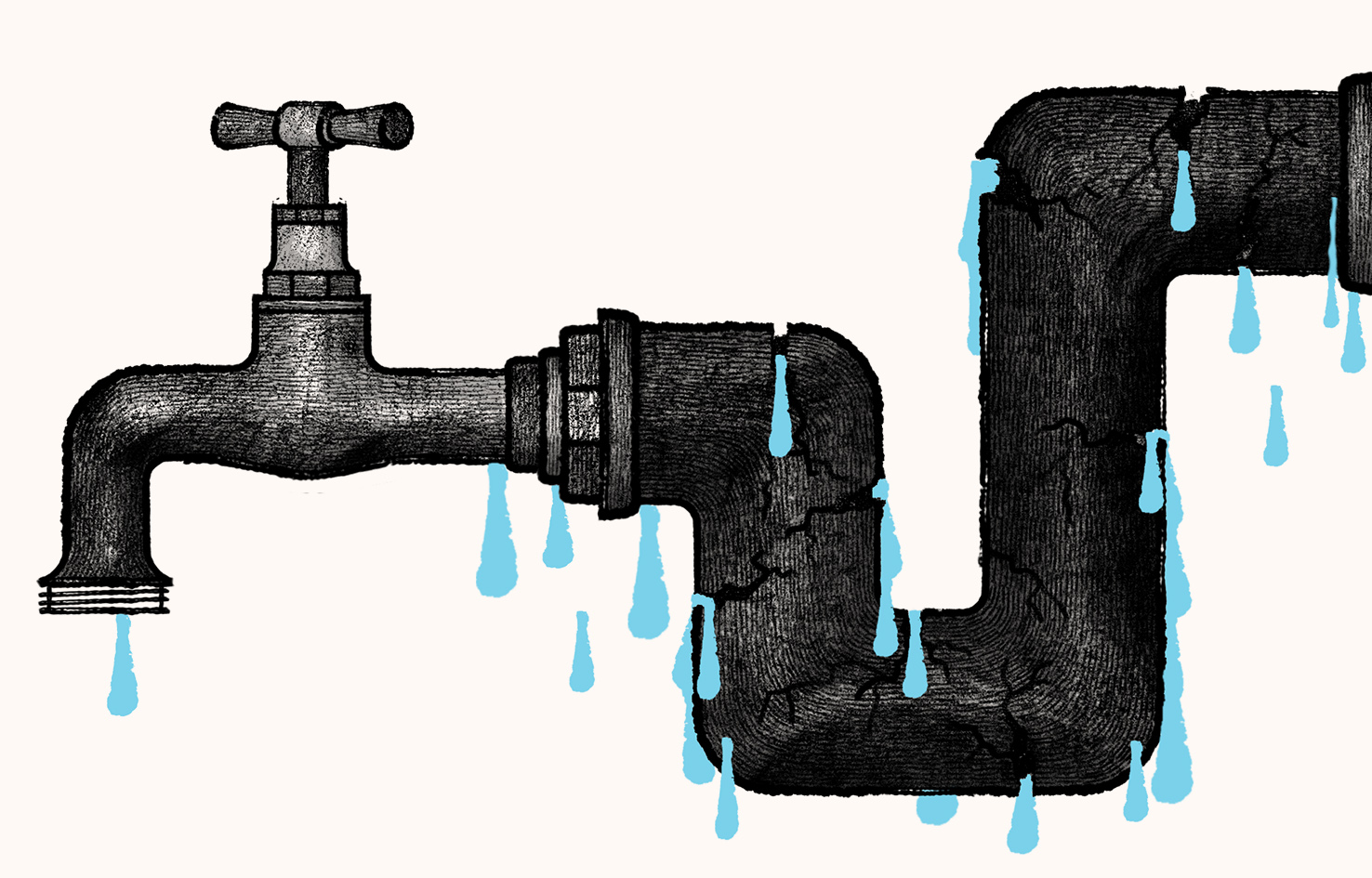Illustration by David Foldvari
What would you say was a water company’s most precious resource? The phrase “most precious resource” here is the coinage of Sir Adrian Montague, current chairman of Thames Water. Last week he was called on to reflect upon his beleaguered company by the Commons environment, food and rural affairs select committee. So what do you think he said was its most precious resource?
Most of you are probably thinking: water. It seems obvious. Water may actually be the most precious resource on the planet – although air is surely in the running. Without air the absence of water feels like a comparatively long-term problem. Still, you can’t stay alive without either and perhaps dying of asphyxiation is a more merciful end than thirst. Plus, you don’t have to carry air around with you – unless, ironically, you’re trying to do things underwater – so perhaps water is the resource whose preciousness we should emphasise. And if your job is chairman of a water company, you could be forgiven for having water’s preciousness at the forefront of your mind.
So it’s not very surprising that Sir Adrian Montague didn’t say his company’s most precious resource was air. What is more surprising is that he didn’t say it was water either. Or even money – but then Thames Water doesn’t have any of that particular precious resource, just billions of pounds of negative money which, to put it in water terms, would be like having several million megatons of those little sachets of silica gel all ready to be tipped into Lake Windermere and turn it into a disconcerting Cumbrian version of the Aral Sea. Another thing he didn’t think was Thames Water’s most precious resource was its vast water supply and sewerage infrastructure, which was built decades ago at the taxpayer’s expense and which the company has allowed to descend into a state of catastrophic decrepitude with more fluids squirting out where they shouldn’t than on the last night of a sex addicts’ conference.
So what did Sir Adrian Montague say? He said: “We have a bonus scheme to protect our most precious resource, which is the senior management team.” Surprising, isn’t it? It’s quite an incompetent remark. To be fair, though, and bearing in mind the state of the company, nobody wants the standard of management at Thames Water to decline. That prospect would be truly frightening. There’s no room for manoeuvre in that direction. But that’s no reason to think the company is currently being led by the absolute A-team. After all, the leader of its senior management team just told some pretty hostile MPs that its most precious resource was its senior management team, so we know that he, for one, is an idiot.
“Our most precious resource, which is the senior management team.” This is so easy to take the piss out of, it feels like I shouldn’t. It seems unkind. Would it be punching down? Surely not! Sir Adrian has been chairman of British Energy, Friends Provident and Aviva – that’s some high-level chair work. This is a man who knows how to sit down. And to be fair, Thames Water really does need to spend money protecting its most precious resource. If only Montague had realised what that resource was, he might have spent the money mending pipes instead of on bonuses in a desperate attempt to stop his executives applying for jobs at companies they wouldn’t be ashamed to mention they worked for at parties.
We should be thankful that Thames Water has been left in the hands of men of such feeble vision
We should be thankful that Thames Water has been left in the hands of men of such feeble vision
The truth is that Montague, and Thames Water’s CEO Chris Weston, who was sitting next to him in front of the committee, are doing their level best to keep Thames Water going. This has made them both, in different ways, project a sort of injured pride. Weston seemed nervous and hurt while Montague had a touch of Jack Nicholson in A Few Good Men, with neither the time nor the inclination to explain himself to men who drink the water he provides and then question the means by which he provides it.
Weston was cheeky enough to suggest that Thames Water was in such a parlous state – hugely in debt and scrabbling around for investors – that Ofwat should let it off some of its huge financial penalties for wreaking environmental havoc: “Although we might not be meeting Ofwat’s targets, we are generally improving… and I think we need to recognise that… to allow the company to continue to recover,” he quavered hopefully.
Montague and Weston are both working desperately hard to find investors, restructure debt, court their favoured potential buyer (a terrifyingly malevolent-sounding firm called KKR) and fob off Ofwat (or Foboffwat), with Montague reminiscing: “There were times in the last year that we had five weeks’ liquidity – and running a £20bn corporation on five weeks’ liquidity is honestly hair-raising.” He should try swimming in raw sewage.
“What more can we do?” they seem to be asking. My answer is simple: nothing, so give up. The whole of water privatisation has been a disaster. Many, many billions have been extracted by the shareholders and executives of these water companies. That’s the very money we now need to repair hundreds of thousands of miles of pipes and sewers, but it’s irrecoverable, gone into private pockets. The private sector has not delivered the investment the Thatcherites promised – instead it has sucked money out and left us with a crumbling system owned by indebted companies. Keeping Thames Water going is an unworthy aim and so we should be thankful it has been left in the hands of men of such feeble vision.
Newsletters
Choose the newsletters you want to receive
View more
For information about how The Observer protects your data, read our Privacy Policy
They don’t really understand the problem: providing running water and sewerage to millions of people isn’t profitable. They kept referring to Thames Water as a business but it isn’t one. It’s a service. A service that needs to be paid for – and was paid for, by households, but that money has simply been given away. And last year, even as the firm courts bankruptcy and the rivers fill with excrement, £158m was handed out in shareholder dividends and £195,000 to Weston as a bonus. Something definitely smells of shit.



